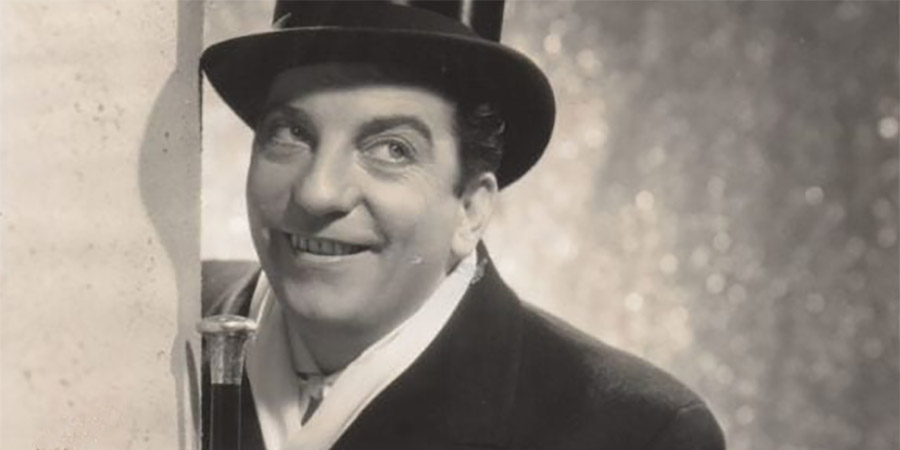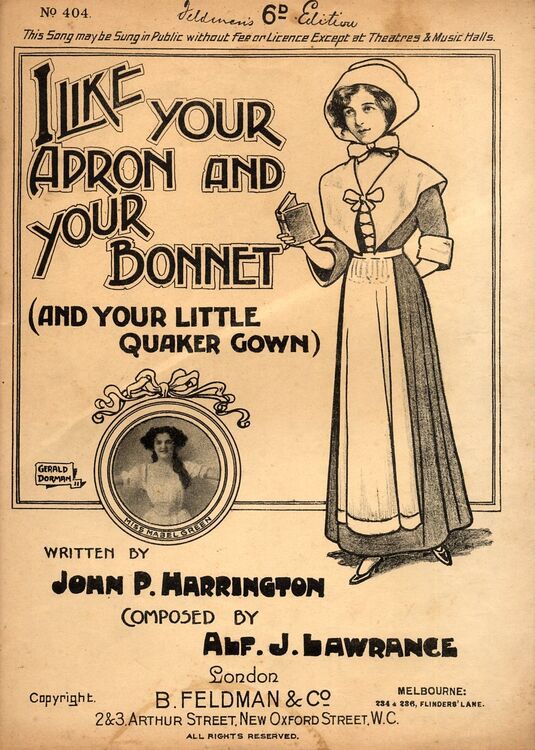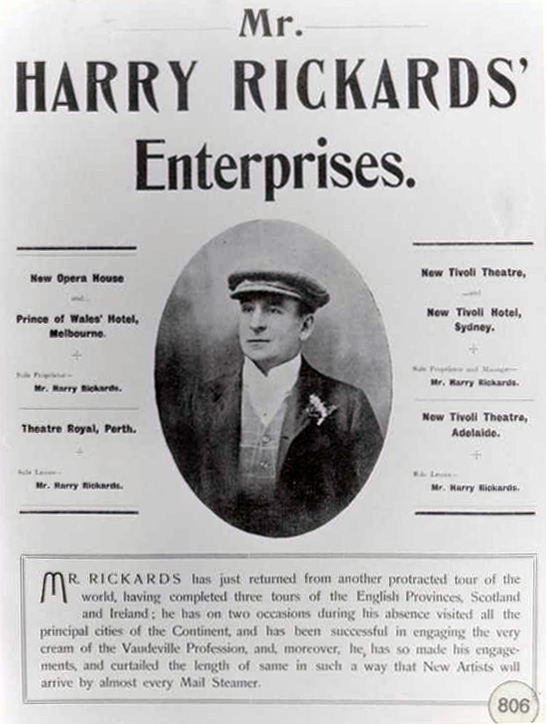Music hall and variety Page 10
Quote: Hercules Grytpype Thynne @ 20th November 2023, 12:51 AMWAKEY, WA.........KAY!! followed by, usually, "Somebody stole my gal"
Used to love that time, just after Sunday dinner (as we called the midday meal then), and loved the short jokes he made with the band & co after the programme had finished, as he put his coat on and went home 😄
Such wonderful memories of me and my Mum & Dad - now, so sadly long gone
Indeed. www.youtube.com/watch?v=lAacOHkQMzw
Quote: Chappers @ 20th November 2023, 3:17 PMAnd Billy it would have been apple crumble for Billy Cotton at Sunday lunchtime.
Only if somebody had sat on the pie.
Quote: Billy Bunter @ 20th November 2023, 4:41 PM
Quote: Hercules Grytpype Thynne @ 20th November 2023, 12:51 AMWAKEY, WA.........KAY!! followed by, usually, "Somebody stole my gal"
What a memory this boy has got - exactly as I remembered it. Oh, such happy days.
Dan Leno (born 20 December 1860 in St Pancras as George Wild Galvin} was a leading Music Hall comedian and musical theatre actor during the late Victorian era, also also known for his dame roles in the annual pantomimes that were popular at London's Theatre Royal, Drury Lane from 1888 to 1904.
Leno began to entertain as a child. In 1864, joining his parents on stage in their music hall act, and he made his first solo appearance, aged nine, at the Britannia Music Hall in Coventry. As a youth, he was famous for his clog dancing and, in his teen years, he became the star of his family's act. He adopted the stage name Dan Leno and, in 1884, made his first performance under that name in London. As a solo artist, he became increasingly popular during the late 1880s and 1890s when he was one of the highest-paid comedians in the world. He developed a music hall act of talking about life's mundane subjects, mixed with comic songs and surreal observations, and created a host of mostly working-class characters to illustrate his stories.
In 1901, still at the peak of his career, he performed his "Huntsman" sketch for Edward VII at Sandringham, a recording of which is below:
http://www.youtube.com/watch?v=Ja-5bwaelVE
The monarch was so impressed that Leno became publicly known as "the king's jester":
He continued to appear in musical comedies and his own music hall routines until 1902 although he was beginning to suffer increasingly from alcoholism. This, together with his long association with dame and low comedy roles, prevented him from being taken seriously as a dramatic actor and he was turned down for Shakespearean roles.
He began to behave erratically and suffered a mental breakdown in early 1903. He was committed to a mental asylum but, although he was discharged later that year, his health continued to decline and he died on 31 October 1904, aged 43. He is buried in Lambeth Cemetery:
Here is a short nine minute biographical film of his life and times:

One of the lesser known World War II songs from Flanagan & Allen:

A new documentary by Will Bird, member of the British Music Hall Society, on the lost godfather of British comedy, Sid Field - his life and legacy, featuring an all star cast including Laurence Olivier, Petula Clark, Wee Georgie Wood, Bob Monkhouse, Laurel and Hardy and many more...
http://www.youtube.com/watch?v=lWPTObiWUcc
Sid Field (1904-1950) attained huge success on the West End stage during the Second World War, after toiling away for nearly 3 decades in provincial theatres. A stand-up comedian whose act was ahead of its time and influenced a generation of actors and a comedians from Laurence Olivier to Tony Hancock and Morecambe and Wise.
Born this day in 1925: Ernie Wise. Needs no introduction of course. Here are two Morecambe & Wise sketches from 1963:
Firstly a radio broadcast from the Jubilee Theatre, Blackpool in August that year (the same month as the great train robbery):
www.youtube.com/watch?v=GaGEl9AddzI
and then, on tv, with the Beatles in The Morecambe & Wise Show of 2 December (10 days after the assassination of President Kennedy and 4 days before the gaoling of Christine Keeler for perjury and conspiracy to pervert the course of justice):

Sheet music for the Quaker song I like your Apron and Your Bonnet (and Your Little Quaker Gown)
Extract from British weekly newspaper "The Era" of 3 February 1912:
So great is the vogue for... ...dainty Quaker number "I Like Your Apron and Your Bonnet" that it forms an interesting speculation as to the exact number of girls who are nightly employed singing it either in Pantomime or on the Halls or on the Concert Platform. At Leeds it was sung at the Theatre Royal by Miss Florrie Forde, at the Grand Theatre by Miss Elsie Erskine, and at the Hippodrome by Miss Molly McCarthy. This is truly a triumph which it does not fall to the lot of every song to achieve
This is a version recorded by Harry Fay recorded in 1911:
http://www.youtube.com/watch?v=nQYzqJBrh-Y
Harry Fay was one of the names used by English singer and comic entertainer, Henry Thomas Fahey (born 22 May 1878), an English singer and comic entertainer who recorded popular songs between the 1900s and late 1920s under a variety of names, including Fred Vernon, Arthur Norton, Jack Hay, and Harry Carlton.
He was born in Liverpool into a family of Irish origin. He performed on stage in music halls before making records. As Harry Fay, he recorded for Zonophone Records. The 1919 catalogue for the record label lists him as a "comedian", with over 60 songs recorded as a solo performer, as well as several duets with baritone singer Stanley Kirkby. Among the popular songs he recorded were Has Anybody Here Seen Kelly?, By the Light of the Silvery Moon, Lily of Laguna, It's a Long Way to Tipperary, Alexander's Ragtime Band, and Hello! Hello! Who's Your Lady Friend?] For the Columbia-Rena label, he recorded Let's All Go Down the Strand, one of his biggest successes, in 1910 and also recorded for many other labels, using different pseudonyms, and continued to record comic and other, songs until 1929.
He died in hospital in Barnet on 4 September 1956.
Quote: Billy Bunter @ 29th September 2023, 4:51 PM
On 29 September I wrote about a new project - and forthcoming album - by 1970s/1980s singer Joe Jackson, recreating the music hall songs of Max Champion {possibly nephew of Harry Champion).
That album has now been released and here is a short film - including input from Joe Jackson himself - explaining the reason behind the venture plus an interesting recording of Max Champion singing "The Bishop and the Actress", which is recreated on Joe Jackson's album.

Born on this day in 1843 in Stratford, East London: Harry Rickards (born Harry Benjamin Leete) was a 'lion comique' {a type of popular entertainer parodying upper-class toffs or "swells" whose stage appearance, resplendent in evening dress - and generally white tie - contrasted with the cloth-cap image of most of their music-hall contemporaries} of the 1880s but was also successful as an entrepreneur in Australia, where he developed the "Tivoli circuit". He encouraged local talent & imported many acts from the UK & USA to 'play the Tiv.'
It was intended that he be an engineer and he was forbidden by his parents, during his apprenticeship, to attend theatres. However, he developed a talent for comic singing and was engaged as a vocalist at music halls in Canterbury and Oxford, where he appeared under the name of "Harry Rickards". He established a reputation as a singer of comic songs (such as Wot Cher!. The Mad Butcher, Knocked 'em in the Old Kent Road and His Lordship Winked at the Counsel, performing for the Prince of Wales.
He then travelled to Australia, reaching Melbourne on 28 November 1871 and made his first appearance there at the St George's Hall on 9 December 1871. He went on to Sydney where he also appeared with great success. Finding himself in debt in 1874, he toured the United States, returning to London the following year, and also toured a company in South Africa in 1876. Returning to England he was a successful "lion comique" at the music halls and a good pantomime comedian, particularly in the provinces.
He again visited Australia in 1885 and for some years toured Australia with much success with a vaudeville company, of which he was the "star". About 1893 he bought the Garrick theatre, Sydney and renamed it the "Tivoli" whereupon he built up the Tivoli circuit, taking control of the Opera House, Melbourne, and was also lessee of theatres in other state capital cities.
Every year he visited England, and over the next 18 years he engaged for the Australian variety stage great artists such as Harry Houdini, Marie Lloyd, Little Tich, W G Fields and many others of great talent whom he paid well.
A sufferer of diabetes, he died from apoplexy in Croydon on Friday the 13th of October 1911 and his body was returned to Australia to be buried in Waverley Cemetery, Sydney. He is probably better remembered in Australia than in Britain {for some 25 years his name was a household word in Australia and at the time of his death his business as a single-handed manager and proprietor was one of the largest in the world} and here is an Australian take on his life & times:

Born this day in Stockton-on-Tees in 1888, Will Hay, although better remembered today for his films, started out on the stage with MusicHall sketch impresario Fred Karno and was a major influence on many of the British comedians who followed him including the likes of Ken Dodd, Eric Morecambe, Tommy Cooper, Harry Worth, Harry Enfield, Jimmy Perry, David Croft and Ronnie Barker.
Hay decided to become an actor when he was 21 after watching W. C. Fields perform a juggling act in Manchester. In the early years of the twentieth century he experienced some moderate success as a stand-up comedian and an after-dinner speaker. His first professional job came when he was offered a contract to perform at a theatre in Belper, Derbyshire and, in 1914, he began working with the impresario Fred Karno who had previously helped Stan Laurel and Charlie Chaplin achieve success. He worked with Karno for four years and first performed his schoolmaster character in 1910 which he based upon a colleague of his sister, who was a teacher. The characterisation was initially performed in drag as a schoolmistress, but he transferred the character to a headmaster.
The acts in which Hay performed the schoolmaster sketch became known as "The Fourth Form at St. Michael's". He toured with the act and appeared in the USA, Canada, Australia and South Africa. His wife, Gladys, often played a schoolboy or the character Harbottle in his sketches. The Harbottle character was one of the most appreciated in these acts - a dim-witted, nearly deaf old man who is still in school because he's so backward. The character later featured in Hay's films portrayed by Moore Marriott. Here are two Columbia recordings of the classroom sketches from his stage show:
http://www.youtube.com/watch?v=yvJ4n5VVVz0
Hay published a magazine piece entitled "Philosophy of Laughter", in which he discussed the psychology of comedy. In the essay he rhetorically asks:, "Why does every one of us laugh at seeing somebody else slapped in the face with a large piece of cold custard pie? Is it because we're all naturally cruel? Or is it because there's something inherently funny in custard pies? Or in faces? Or in throwing things? No, no, and no! The real reason why we laugh is because we are relieved. Because we are released from a sense of fear. Wherever we may happen to be - in the cinema, theatre, or music-hall - we tend to identify with the actors we are watching. So that when a custard pie is thrown we fear for a moment that it has been thrown at us. And then, immediately we realise that it hasn't hit us, we experience a feeling of relief, and we laugh"
In June 1932 he joined the British Astronomical Association, in November of the same year he became a Fellow of the Royal Astronomical Society. He is noted for having discovered a Great White Spot on the planet Saturn in 1933. He also has an asteroid named in his honour - Asteroid 3125 Hay. He kept his career in astronomy separate from his comedy career and published "Through My Telescope" under the name of W.T. Hay, using the same title when giving lectures.
In 1946, while on holiday, Hay suffered a stroke which left the right side of his body crippled and also affected his speech. On Good Friday 1949 he addressed an audience of his peers at a dinner organised by the Grand Order of Water Rats but suffered another stroke two days later and he died at the age of 60 on 18 April 1949. He was buried in Streatham Park Cemetery.
Max Miller sings: A New Kind of Old-Fashioned Girl and then chooses from the white book or the blue book:
"They'll never be another", and he was so right

Barbara Windsor's appearance on the Good Old Days episode of 3 February 1977:
We are now entering panto season, both in the West End and in the provinces. Though, not so many years ago, pantomimes tended not to begin until much nearer Christmas, maybe with other Christmas shows preceding them. In 1958, for example, Gerald Campion reprised his tv role in "Billy Bunter's Mystery Christmas" at the Palace Theatre and the following year starred in "Billy Bunter Flies East" at the Victoria Theatre, matinees only, alternating with the Crazy Gang in "Clown Jewels" (with Peter Glaze). The London Palladium pantomime that year, "Humpty Dumpty" with Harry Secombe, Alfred Marks & Roy Castle, ran from 23 December.
Billy Bunter's Swiss Roll ran at the Victoria Theatre in December 1960 (with Keith Banks as Bunter) again performing matinees only and alternating with the Crazy Gang, this time in "Young At Heart". The London Palladium pantomime, "Turn Again Whittington" with Norman Wisdom, ran from December 22.
"Billy Bunter Shipwrecked" and "Billy Bunter's Christmas Circus" also ran at the Victoria Theatre in 1961 & the Queens Theatre in 1962 respectively and the last Billy Bunter inspired show was "Billy Bunter meets Magic" at the Shaftesbury Theatre in which he shared top billing with David Nixon in 1963.

